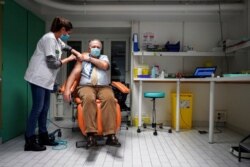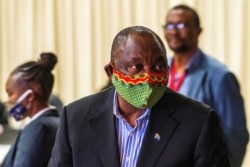Officials at the World Health Organization said its efforts to investigate the origins of the coronavirus are not about finding “somebody to blame” as the agency sends a team of international experts to China this week.
WHO emergencies chief Mike Ryan told a news briefing in Geneva Monday “we are looking for the answers here that may save us in the future. Not culprits and not people to blame.”
If blame exists, Ryan said, “we can blame climate change. We can blame policy decisions made 30 years ago about everything from urbanization to the way we exploit the forest.”
Speaking earlier at the briefing, WHO Director-General Tedros Adhanom Ghebreyesus said the team traveling to China would seek to understand the source of the early infection in the central city of Wuhan.
Their comments came after China announced that the WHO team would arrive in China Thursday.
It was not immediately clear, however, if the experts would be allowed to travel to Wuhan, where the virus originally emerged in late 2019.
“It’s very important that as the WHO is in the lead in fighting the pandemic, that it also has a leading role in trying to look back at the roots of this pandemic so we can be better prepared for the next one,” United Nations spokesman Stephane Dujarric said about the team’s travel to China.
Also on Monday, China announced 103 new COVID-19 cases, the country’s biggest jump in infections in more than five months.
France also reported a rise in infections, saying in newly released data Monday that cases are on average increasing by more than 18,000 a day, a seven-week high. France's cumulative total of cases stands at 2.8 million, the sixth highest in the world, according to the Johns Hopkins Coronavirus Resource Center.
In Britain, Prime Minister Boris Johnson said Monday that tougher lockdown measures could be necessary if cases continue to rise. He urged the public to have “maximum vigilance” in adhering to the current restrictions.
The British government Monday launched an ambitious coronavirus vaccination plan, with the goal of having 15 million citizens inoculated by the middle of next month.
In a statement, the health department said the plan is to have 2,700 vaccination sites around the country, with one located within 16 kilometers of every person in Britain by the end of January.
The death toll in Britain has been soaring. It now stands at more than 82,000 — the world's fifth-highest toll — while more than 3 million people have tested positive for the coronavirus, according to Johns Hopkins University.
In Portugal, President Marcelo Rebelo de Sousa tested positive for the coronavirus but has so far shown no symptoms, his office said Monday.
In the United States, the Centers for Disease Control and Prevention said nearly 9 million Americans had been given their first COVID-19 vaccination dose as of Monday morning. That is less than one-third of the total doses distributed to states by the U.S. government.
The rollout of the COVID-19 vaccine in the United States has been fraught with problems, according to an Associated Press report.
Gianfranco Pezzino, who was the public health officer in Shawnee County, Kansas, until his recent retirement, told AP, “The recurring theme is the lack of a national strategy and the attempt to pass the buck down the line, lower and lower, until the poor people at the receiving end have nobody else that they can send the buck to.”
In another development Monday, two gorillas at California’s San Diego Zoo have tested positive for COVID-19 after exhibiting symptoms of the disease. The cases are believed to be the first known cases of the virus in apes.
California Gov. Gavin Newsom said health officials are trying to determine whether the virus was transmitted between animals or from humans to the apes.
In South Africa, President Cyril Ramaphosa announced his country has secured 20 million doses of COVID-19 vaccines, which he said are expected to be delivered mainly in the first half of the year.
The British variant of the COVID-19 virus, thought by scientists to be much more contagious, has been found in Russia, according to news reports Sunday.
Russia, which has recorded more than 3 million cases of the virus, had already suspended flights from Britain until January 13 and is mandating a two-week isolation period for those traveling from Britain.
The British variant of the virus has been found in 45 countries and at least eight U.S. States. Another variant discovered in South Africa was found Sunday in some positive cases in Ireland.
Yet a third new variant has been found in Japan in travelers from Brazil. The Brazil variant is different from the British and South African variants, but the three share a common mutation.
While the variants are worrisome, they are not unexpected, according to scientists. The coronavirus has made thousands of tiny modifications since it was first discovered, researchers say.
Johns Hopkins reported late Monday that there are more than 90.7 million global COVID-19 cases. The United States has the most with 22.5 million, followed by India with 10.5 million and Brazil with 8.1 million.
Worldwide, nearly 2 million people have died from COVID-19.









